
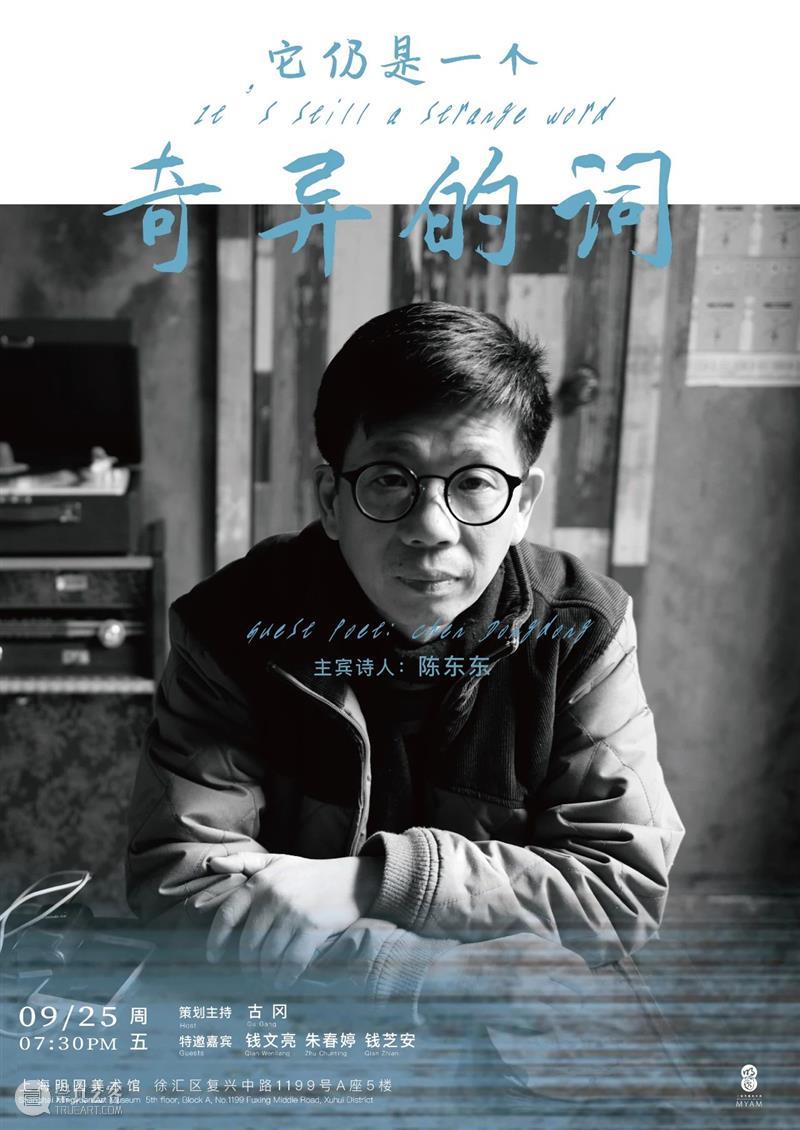
语句的关系和表述惯性带来的审美感,往往容易造成真实的错觉,以为古典榜样的稀释就是真实,文学范型的腔调就是真实。
讲读会实录,点击回看
● Click back to see the full version of salon
海上诗歌艺术沙龙(城市 · 言志系列第二十期)“它仍是一个奇异的词”——陈东东诗歌讲读会于9月25日晚在上海明圆美术馆举办。主宾诗人陈东东,策划主持古冈,嘉宾钱文亮、朱春婷、钱芝安等人出席沙龙现场。陈东东自1980年开始写诗至今已四十年,见证中国当代诗歌发展的同时也成为上海乃至全国独树一帜的先锋诗人。其对世界认识的不断深化和对自我不断重新认识的思考,以隐秘孤独而又匠心独运的面目呈现在观众眼前。
Art salon in poetry @ Ming Yuan Museum (the 20th episode) "Still, it is a bizarre word"-Poetry salone with Chen Dongdong was held on 25th of September at Ming Yuan Museum. The main guest was the poet Chen Dongdong, Planning and presiding Gu Gang, Guests Qian Wenliang, Zhu Chunting, Qian Zhian and others attended the salon. It has been 40 years since Chen Dongdong began to write poetry in 1980. He witnessed the development of contemporary Chinese poetry and became an avant-garde poet in Shanghai and even the whole country. His deepening understanding of the world and thinking about constantly rediscovering yourself , He presents himself to the audience as a secret, solitary, and craftsman spirit.
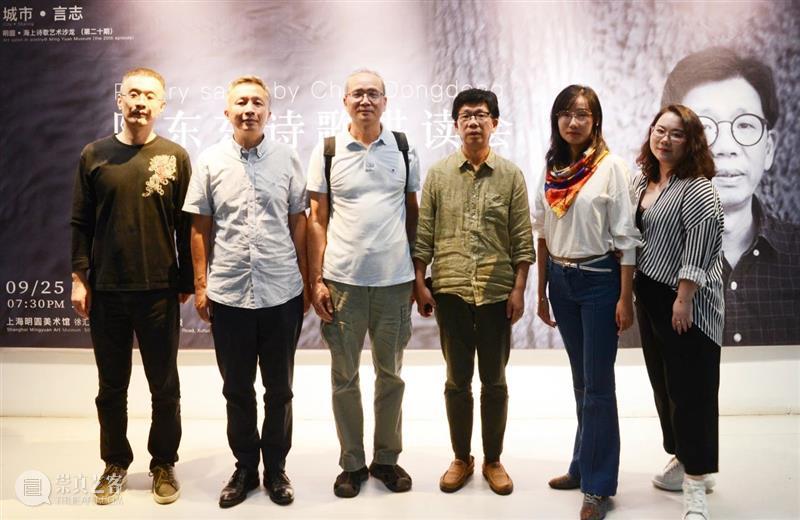
左起:王君、古冈、钱文亮、陈东东、朱春婷、钱芝安
Group photo (From left) : Wang Jun, Gu Gang, Qian Wenliang, Chen Dongdong, Zhu Chunting, Qian Zhian
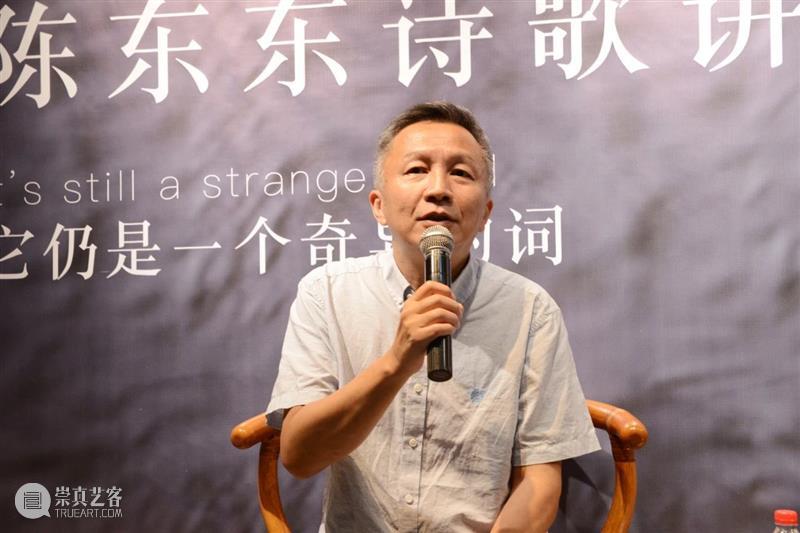
Chen Dongdong: Although I came from a music family, my dad is a teacher of Shanghai Conservatory of Music, and my mother is a Yue opera actor. But I don’t remember how they taught me about that. I was actually stocked and they didn’t care about my homework at all. Moreover, children are still rebellious. I remember that I didn’t like Yue opera when I was a child, probably because my mother sang Yue opera, I did that deliberately. I can’t say that I don’t like music, but I might not like what my father studied — his major is the history of Modern and Contemporary Chinese music. One of the textbooks about this field that currently used in universities was written by him. The 60s and 70s, including the 80s, the teaching of this subject is similar to Chinese modern and contemporary literature, or maybe even worse. It is very rigid, full of explanations of so-called music works of revolutions, which has a lot to do with the Cultural Revolution. I have always been a little unable to listen to that kind of music. In addition, my father has always intentionally refused to let me learn music. This is also due to that era.
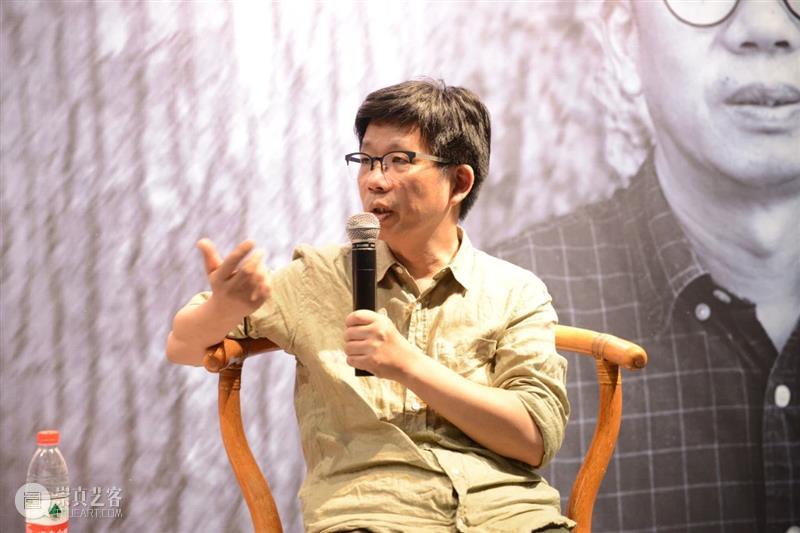
陈东东回忆儿时经历
Chen Dongdong recalls his childhood experiences
Gu Gang: Speaking of your poems, our publishing house is honored to publish a collection of your poems called "Liu Shui". Many of them are related to music, right?
Chen Dongdong: The origin of this book was when Liu Xuefeng (he was the editor-in-chief of Philharmonic at the time) asked me to write abook about music. He wanted to put it in a set of books about music, but I never finished it, the process was very slow. When I met him again, he told me that the series had already been published... Then there was no publishing requirements and regulations, so I wrote it completely according to my own ideas, I changed the original essay and wrote a poem text, a long poem, a poetic work.
Gu Gang: I read the girdle of this book. Jin Yucheng’s recommendations say that it has science-fictional elements. Do you think it is accurate?
Chen Dongdong: There are indeed, for example, some chapters are about astronaut stories in fantasy... There are many stories about the Guqin music "Water". The known storiy of Bo Ya and Zi Qi are very famous, and the United States launched Voyager No.1 and No.2, there is a disc intended to communicate with aliens that contains many sounds from the earth, among which is the Guqin song "Water". This is also a basis for the fantasy aerospace story I wrote in "Liushui".
古冈:我觉得不单单这本《流⽔》,还有很多⻓诗有这种⾳乐的结构。这是你⾃学的?你研究乐理吗?为什么安排这样的结构?
Gu Gang: I think not only this "Liu Shui", but also many poems have this musical structure. Did you learn this by yourself? Do you study music theory? Why do you arrange such a structure?
Chen Dongdong: Poetry must consider the structure. Poetry and music are closely related. For example, the structure and layout of Eliot's “Four Quartets”, and even the structure and layout of some of Kundera's novels, are all based on the style of music. My "Liu Shui" also mimics the structure of the Guqin music "Water". Chapter titles such as "Cause", "Resurrection", and "Tail" are also from there. This doesn’t means that the structure of a long poem must correspond to the musical style. In fact, in poetry or language, there must be something musical. There is no need to learn it on purpose. The poet will instinctively establish his own musical structure and his own musicality.
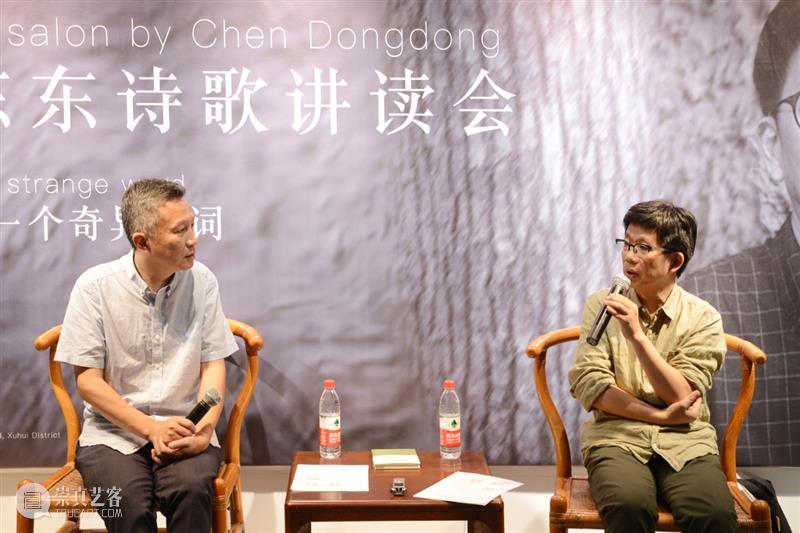
陈东东与古冈谈论《流水》
Discussion between Chen Dongdong and Gu Gang on the Poem ‘Flowing Water’
Gu Gang: Many readers and critics comment that your poems have the character of musicality. What does this mean? Is it because it is readable, or something else?
Chen Dongdong: Definitely I need to consider these aspects, but they should not just refer to these. The musical rhythms and sound types of classical poems are relatively fixed, especially for Tang poems, Song iambic verse and Yuan Drama. The number of characters, tonal styles, and rhyme in each line are all prescribed. The musical forms are basically fixed, just fill in the structure. But new poems are the so-called free poems. Every poet is responsible for inventing their own sound style and musicality. It has no template. I think to invent each poem's own music is a great feature of new poems. You have to invent the style of poem that suits it and the musicality that belongs to it based on what you write and the subject matter you are dealing with.
Gu Gang: So this requires a high level of techniques.
Chen Dongdong: I find it more difficult than writing traditional poems. Many people mistakenly think that new poems are easy to write, old poems should be rhymed, and tones can not be wrong, etc. But in fact, they are easy to write when people become familiar with it. Therefore, ancient people can randomly write a poem that meet the requirement of poetry while drinking wine. Because its musical formulas are fixed, it can be learned and copied. It is a part of the education of traditional poetry, such as private schools taught counterparts and so on. Old poetry can be learned, it is a skill that can be applied after mastering it. New poetry must be creative, so it is difficult. One could say that the musicality of new poetry cannot be taught. It has to be adaptable to different conditions and changes. I think the musicality of new poems follows the content, which also makes the standards of new poems not easy to set...
古冈:这么⼀说,把在座想写新诗的年轻人给吓到了……
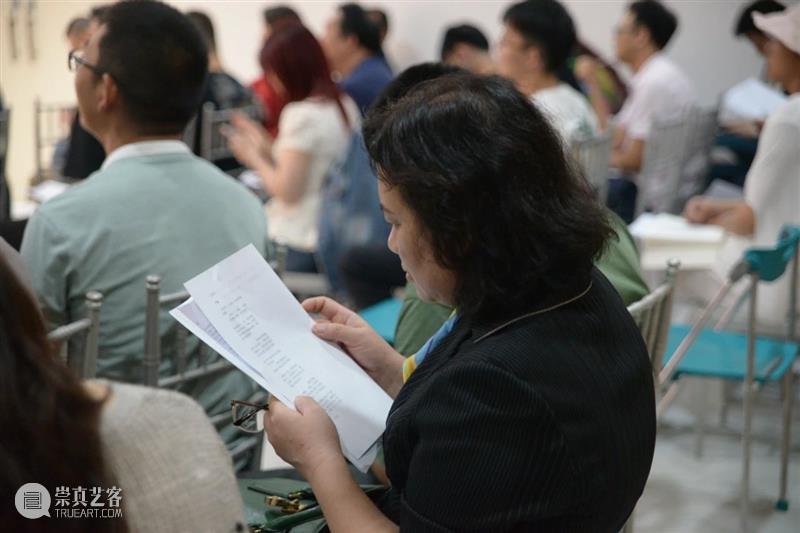
Gu Gang: I have another impression of Dongdong. He writes — I don't know whether it will inspire young people or not — he would concerntrate on one of his favorite poet, very focused and research a lot, then create his own style. This poet is called Odysseus Elytis. He is an excellent poet from Greece, and won the Nobel Prize. I also bought Elytis's book. How do you interpret him?
Chen Dongdong: I was studying at Shanghai Normal University at that time, and I was already influenced by poetry. One of my flatmates was a poet. He has been writing since middle school. I think he writes very well. He showed me the poems he wrote, and also recommended poems by Shu Ting, Gu Cheng, and Bei Dao. I thought that maybe Bei Dao's poems were better than him, but Shu Ting’s and Gu Cheng’s were really not as good as his. So because of him, I already like poetry. Most importantly was that, one day, I read Elytis’s poem, he was the winner of the Nobel Prize in 1979, I read his poems translated by Li Yeguang from the "World Literature" magazine in 1980. I was shocked at the time and I was deeply attracted. I was in the first year of university, I entered in 1980.
Gu Gang: How do you think Elytis has influenced you?
陈东东:他的节奏和⾳乐性好像是我以前在别的诗人那里没有感受过的,节奏雄伟和海洋性,明亮透明的⽓息……另外他的诗歌理念⽐较对我胃⼝,比如去翻新希腊的传统等等,他受法国超现实主义的影响很⼤,他试图将超现实主义跟希腊传统结合起来。
Chen Dongdong: His rhythm and musicality seem to be something I haven't experienced in other poets before. The rhythm is majestic and oceanic, and has a bright and transparent atmosphere. In addition, his poetry concept is more appealing to me, such as renovating Greek traditions, etc. He was greatly influenced by French Surrealism, and he tried to combine Surrealism with Greek traditions.
Gu Gang: Your poem also has surrealism elements, right?
Chen Dongdong: I think so. I followed him and read about many surrealist poets. But true surrealism is somewhat repellent to me, such as the poems of Breton and Aragon. And I don’t think there is a way to fully write automatically, but such factors can be absorbed into my own writing and create magical things. Those were very attractive to me at the time, and left a strong impression, because I had never encountered them before.
Gu Gang: Sartre used to experience the post-drug state under the supervision of a doctor. A certain dose was controlled to guaranteed not to be addictive. But I think you will definitely not encourage this method.
Chen Dongdong: I know that in fact many poets...For example, when Gainsberg wrote "Howl", he used to take drugs. But wedon’t know, if he doesn’t take medicine, would he really write worse than taking it? Maybe Li Bai can write good poems without drinking, but drinking and taking drugs are not the same thing after all.
Gu Gang: In the early years, critics often said that Dongdong was the representative of intellectuals.
Chen Dongdong: I think the added on attributives are meaningless. For example, someone else said that I am a representative of the third generation of poets. The title of intellectuals are even more unnecessary. I think that every person who writes poems can be regarded as an intellectual — he strives to master the knowledge and skills of writing poetry (or maybe have some knowledge about poetry). In addition, I guess I'm writing staffs like the folks who really live outside the system.
Gu Gang: Zang Di commented on Dongdong's poems as "the diamond of Chinese." One thing that Dongdong impressed me very deeply is that the rhetoric is to the extreme, like Baroque style. He will use linguistic words to a extreme level, but that extreme isrelated to reality. How do you understand "diamond"?
Chen Dongdong: This is probably Zhang Di’s rhetoric.
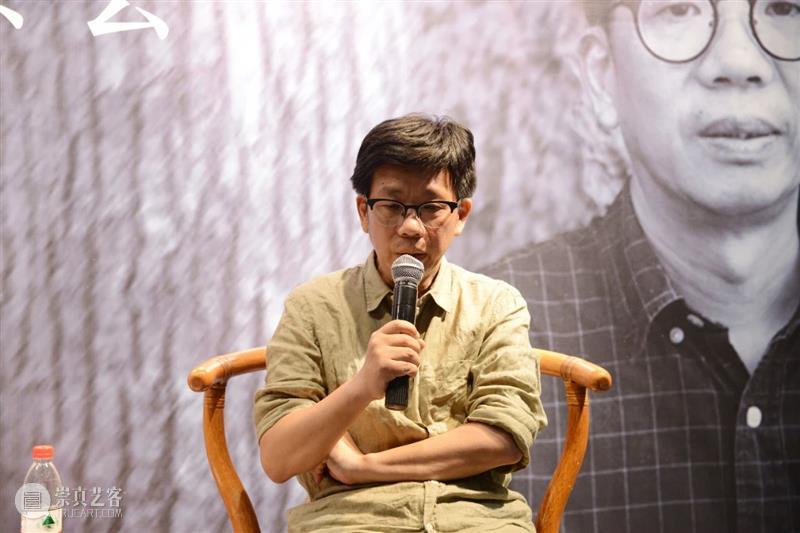
陈东东分享创作时的状态
Chen Dongdong shares the state of his creation
Qian Wenliang: Let me begin with the relationship between Chen Dongdong and I. Dongdong started very early in poetry. Although I was a few years younger than him, he was already a star poet when I started writing poems. The first time I saw his poems was amazing. It was probably in 1987 In "Anthology of Contemporary Chinese Experimental Poems" edited by Wang Jiaxin and Tang Xiaodu. It was amazing and his scriptures are very beautifully written, such as the piece "Loss of Listening and Singing" which mourns Hai Zi and Luo Yihe’s great friendship. It was particularly moving. And his views on modern new poetry inspired me a lot. I often quoted the ideas from this chapter later in my lectures on new poems: "New poems were forced to invent because old poems died on the threshold of modernity and cannot express modernity." I still remember themid-1980s. In the supplement of the “Pingding Daily” edited by Luo Yu, I read Dongdong’s poems dedicated to French surrealist poet Eluard. It was very vanguard. At that time, I had very little contact with the surrealist poetry school. That poem felt particularly shocking. Therefore, some critics hailed Dongdong's early poetry as "Zen Surrealism". It is indeed appropriate. Last year, I helped my friend to do modern poetry interpretation, so I chose Chen Dongdong's "The horse in the rain". I also dedicatedly interpreted this poem in my graduate class. I have many thoughts on “The horse in the rain”. It has metaphors about hibiscus and black or grayrobins. He wrote that he picked up a saddle-like instrument like a cello orguitar in the evening of spring and wanted to play. Because it was raining outside, he would have moments of distraction, entered the stream of consciousness, and entered the reverie. At this time, related to the horse, the sound of the rain came like a horse shoe tapping, and the spring hibiscus and robins had all come. A Wangwei-style ethereal realm appeared. Finally, he returned to reality and played the song he wanted smoothly. The whole poem is about writing a state of meditation. It is very structurally perfect, and it fits well with our traditional Chinese aesthetics of ‘circle’. Many of Dongdong’s poems are very structurally consistent and very harmonious and perfect. Another point is that we often say that Dongdong’s poems are a kind of beautiful poems. Many of them originate in the spirit, far from reality. He gave me this impression in the early days, and this feeling is very magical.
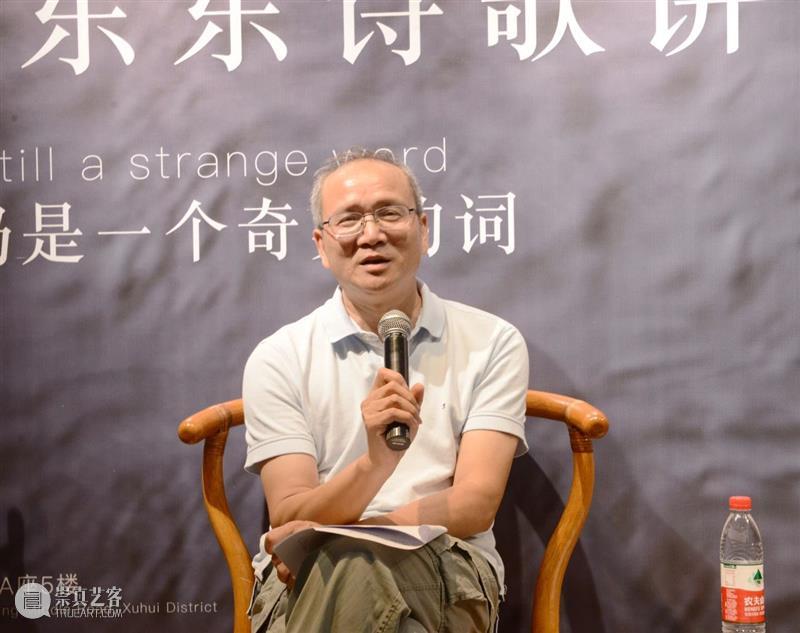
钱文亮谈陈东东诗歌的空灵境界
Qian Wenliang talks about the an ethereal feeling in Chen Dongdong’s poems
Gu Gang: At that time, not many poets wrote like this, was it?
Qian Wenliang: Yes, here comes to another topic, that is, Dongdong's poems are so creative and so lively. Musicality is a very important key. In fact, we can refer to another poet Duoduo. Huang Canran has a famous article called "The Original Contract". He said that many contemporary poets have ruined, destroyed, and corrupted Chinese. And Duoduo touched directly on the core of poems. The core is the relationship between poetry and language, more specifically the relationship between poetry and mother tongue, then Chinese poetry is the relationship between poetry and Chinese. Chinese itself has a very strong poetic function. Pictographic has a poetic function that pinyindoes not have. It is like its own image, a character is like a picture. Inaddition to the picture and visual beauty, there are also musical functions. Such as puns, loopbacks, top truths, retaliations, etc., they are inherently musical. In addition, there are on omatopoeia, such as "zi zai ying jiao qia qia ti", the subtle poetic nature of language which was later destroyed by westernised language. In contrast, Chen Dongdong's poems are the same as Duoduo. I think Dongdong has cut into the core of Chinese poetry. His poems has the advantages of ancient Chinese poetry, and inherited the most precious source of poetry in China that is musicality. But it is not the rigid rules of the outside world, but the beauty of Chinese voiceis written in vernacular, so he is "the diamond of Chinese". This kind of literal appearance looks very natural, but in fact it is the point where the words and sentences are refined. There is no nonsense in his language, no rhetoric on purpose.
Gu Gang: Nowadays, many young people write poems and don't want to make more changes. They seem to trust intuition more.
Qian Wenliang: But Dongdong's poems are also intuitive, but this intuition depends on how you understand it. Some people's intuition is very rough, but Dongdong's intuition has transformed Chinese poetry into arhythm of life, his feeling. The works driven by intuitions are not the same. Both instinctively, what he write was diamond, and what others came out with might be gravel. So this is Dongdong's advantage. Living in the city of Shanghai is his advantage, where Chinese and Western civilizations blend together. Brodsky said, "Poets are son of civilization." Indeed, our poetry is bound to inherit the civilization of human, so it is not obscurantism or primitivism, it should absorb and transform the outstanding progressive culture heritage and then create. Therefore, Dongdong's poems not only have the ethereal and pleasant feeling of ancient poems, but are also deeply nourishedby modernist poetry from the west. But the mainstream of Weatern poetry often emphasizes cognitive speculation, it is more rational, like Eliot, etc. However, Eastern poetry and Chinese poetry abandon this expression of logical and rational thinking, they are integral. Once it is established, the whole liveliness cannot be cut through. I think Dongdong’s poems are like this. His poems are a complete atmosphere. Once you enter, you will be attracted by him. Don't make meaningful explanations about Chen Dongdong's poems, just get intoit, so you will gain a lot. This is in line with the definition of modern poetry, not for one to interpret, but for one to feel.
Gu Gang: But some friends told me that I couldn't understand poems.
Qian Wenliang: Not able to understand is the best condition, if you understand it, it won't be magical. Therefore, we say that the standard of modern poetry aestheticsis alienation, and we need to study it, do homework, and read a certain amount of poems. This is not completely done by the poet, but also needs the reader's own knowledge. Another point is that Dongdong’s poems have sound and color no matter what he writes, they are not intransitive, and their objects are often smooth and beautiful. You can say they are beautiful, but they also have a living mark of city experience — I am most impressed by his writing of living texts about Shanghai, there is a sentence of a double-decker bus coming down from the bridge "Slowly stop the car in the light of the glass of the bankbuilding", fabulous. The name of this poem is "The Bund", it is very well written. It is impossible to write such a city experience that has both form and spirit for those who have not lived in Shanghai or have no feelings. His poems are basically transitive, but they are not realism. His metaphors are very rich, which is related to his broad vision and reading. His images includeboth personal experience, Chinese experience, and indirect modern western experience derived from books, especially this kind of maritime imagery, such as frigate birds, seagulls, and lord of sea. For us from the agricultural society it is very strange. The ocean atmosphere in Dongdong’s poems has amutual relationship with the ocean culture of Elytis, the shining sun from Greece. And similarities between the spirit of praise for people which is related to our eastern philosophy of love for truth, goodness, and beauty, especially Zen. Therefore, Dongdong’s poems are beautifully written, and few have the intention of appreciating ugliness like other modern poets. Although there are more metaphors in the later period, which are complicated and obscure, and are towards western modern poems, they are generally very beautiful to read.
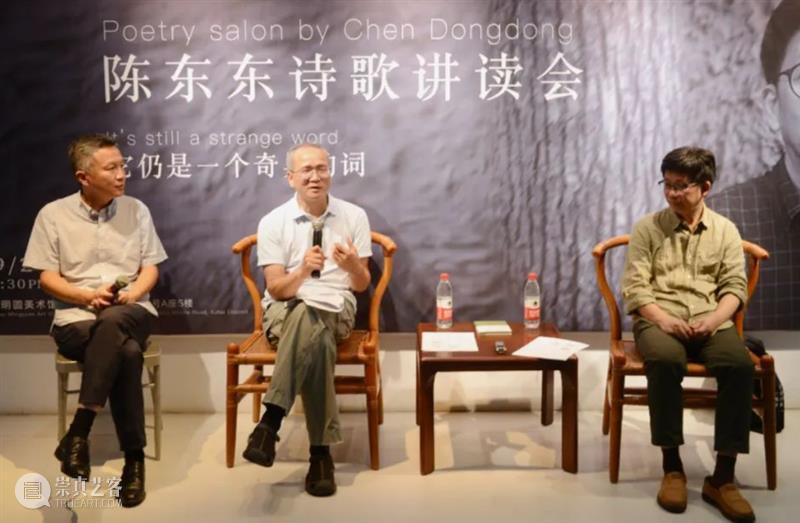
古冈、钱文亮、陈东东谈论诗歌意境
Gu Gang, Qian Wenliang, Chen Dongdong talk about the artistic conception of poetry
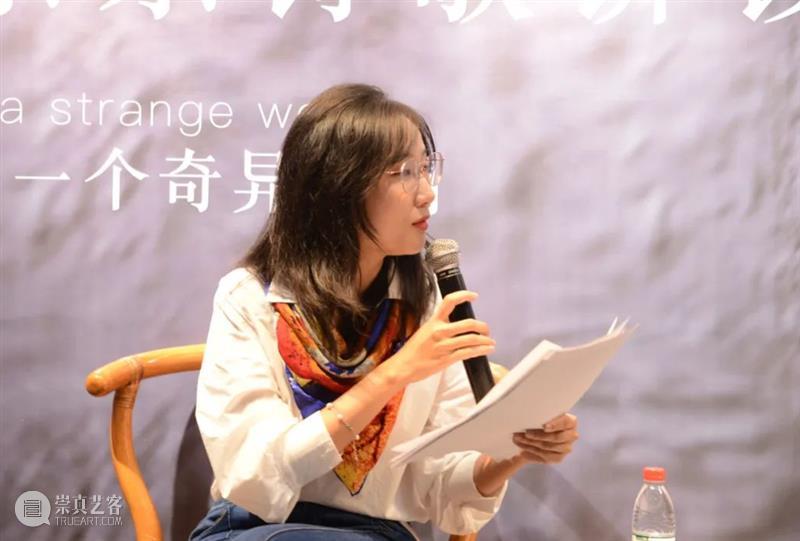
朱春婷谈论陈东东诗集《海神的一夜》中上海的意象
Zhu Chunting discusses the imagery of Shanghai in Chen Dongdong’s poetry anthology ‘One Night of the Sea God’
Chen Dongdong: Let me explain "Luxu", Luxu is my hometown, in Wujiang, very close to Shanghai. I wrote a short footnote on this poem, but itwas removed when it was printed here. In fact, it is better not to remove it."Luxu" tells the story of my grandparents. My grandfather was a young man in Luxu who was very progressive, and he was trying to get in touch with the communist party. My grandma is from Changshu. She and my grandpa went to Shanghai to find the party and joined them. They went to the Liberated Area inthe 1940s. Later, my grandfather and grandma worked in Dazhong Daily inShandong. My grandfather was the director of the newspaper's editorialdepartment. He was criticised as a rightist in 1957, and he was blamed to be ofhistorical anti-revolutionist. They were expel back to Luxu. My grandmother died first. In September 1966, my grandfather was unbearable to parade, fightand criticism, he committed suicide. He wrote his will before his death which was like a poem: "I played various roles on the stage of life. This last scene was slouched. The audience is not discouraged, this scene is worth remembering. Please accept my lesson, the revolution will have to go to the end. " In the poem, I quoted the phrase "revolution has to go to the end". He left a notebook after his death, remembering who gave him a bowl of snails, a handful of vegetables, etc. He wrote that last thing in the notebook is to ask the team to help him pay off all the favors owed from his left wedges, and all the remaining money will be handed over to the public. This is also involved in the poem. Saying this may be worth helping to understand the poem.
Zhu Chunting: Such a story. Such anexperience actually bears a heavy burden on the history of the ancestors, and it is also a historical chronicle corresponding to the entire country. The second meaning of "sea", we see that there is the southern region of Yangtze River behind it. Dongdong’s poems have this kind of meticulously crafted sophistication from the south, so why do we say it is"diamond", it is very delicate, and the surfaces are exquisite and shining accusingly. Every word and sentence is very concise, just like anancient poem. I used to like Kunqu opera very much, and the refined language have the beauty of Kunqu opera very much to the point of "unrefined through refinement". There is no way to add or delete any, because there is already a kind of golden ratio. As a percentage, it can also be said to be the "diamond ratio". Behind it is also a style from the southern region of Yangtze River. This is how I understand "diamond". In addition, the word "God" can also tell that the surrealism aspect inDongdong’s writing, Zen-style philosophies and meditations that beyond these cular space. It can also be seen that there seems to be a "reclusecomplex", which extracts the essence from the inconspicuous things that ordinary people can see. For example,when it comes to "God", this also about Zen philosophy. For example, in this "Old County", at the beginning, it was the feeling of a flower in the world. In the first paragraph, there is “flower”. Clouds and flowers are like a fist, trapped in a certain illusion, like Taoism that began to travel through time and space into the beautiful scenery. Then it is relatedto the traditional memory of the Mid-Autumn Festival. After this ‘out of ordinary’, we see that the end of the poem returns to the transitive reality of life, returning to the simple, the common dish that everyone often have.Normally, ordinary people are not likely to enter this kind of meditation. But the so-called "the way is always in the day", any thing can trigger this kind of rise of poetry. Wherever you go, you can turn into immortals, and there is a kind of oriental charm in it, with a strong oriental classical taste. However, the name "Poseidon" in the collection of poems is a westernised story. After reading the collection of poems, I took a close lookat this poem, this "one night". The poem actually talked about anight of humanity and secular indulgence of Poseidon. Therefore, I feel that Dongdong's understanding of divinity is combined with the eastern classical, which recalls a return to the classicism in the 80s. Prof. Qian said just now that there is no such classical nostalgia as Dongdong’s writing in the past. Most of the research are biased towards learning the west. However, his postureis very clear and he obviously used the south as his discourse resource, like a backlash against the wind of the 80s. Broadly speaking, there was a break in the culture of modern and contemporary Chinese academic history during the May Fourth Movement. This league of leftists represented by Chen Duxiu urgently needed to "turn around" and carry out a comprehensive political, economic, and cultural transformation at the critical moment of the nation. Therefore, the criticism and opposition to Chinese traditional culture at that time was fierce, therefore many people say that a language environment that completely rejects traditional language forms and contents will create a new crisis. Now people say why there is no world-class master Chinese poets in China. It is because they broke away from the culture during the "May Fourth" reformation and abandon the literacy of the entire classical period. So how can this one-century-old modern and contemporary history be compared to other poems that have been preserved for thousands of years of civilization? So I think in this context, Dongdong's contribution to Chinese is extraordinary. Moreover, even if it is not self-consciously, but just a return of unconscious instincts, he also give new generation of poets a movement: inheriting from the traditional culture of Chinese which is very outstanding, and then recreating, sublimating, and improving, which is the so-called “root search”. Therefore, the influence on our young poets is very significant. For example, Qian Zhian and I are both from Shanghai, and we both write with an urban background. So how can people distinguish me from her? How to form a unique character? Then it depends on the cultural heritage and personal interests behind it. Mr Dongdong’s root-seeking posture has created a typical banner. Although Dongdong said that he was very rebellious and didn't like the music form of his father very much, but he obviously inherited his music talent in poetry. Although I am not sure whether Dongdong likes the operas of his mother, his poems do have the exquisite, classical, and aristocratic qualities of classical poetry. Inaddition, for our young writers, the posture of Dongdong spans the middle of east and west, between the internal and external, and also between Surrealism and Eastern Classicism. And did a very good job on both sides, with ease in and out, achieving a perfect balance. At the same time, it also represents the culture of southern region of Yangtze River in which Shanghai is located, facing the integration of commercial, colonial, and oceanic knowledge. I think as our "flâneur", this is a very valuable experience for such a young writer. How to get the best in Shanghai, a landmark city of the east and the west. When wondering in the city, how to achieve both transitivity and not away from reality, how to achieve a lyrical, grounded lyric, and achieve a very subtle capture between surreal and classical. These "in betweens" are all integrated, which I think are very important qualities in contemporary poetry writing.
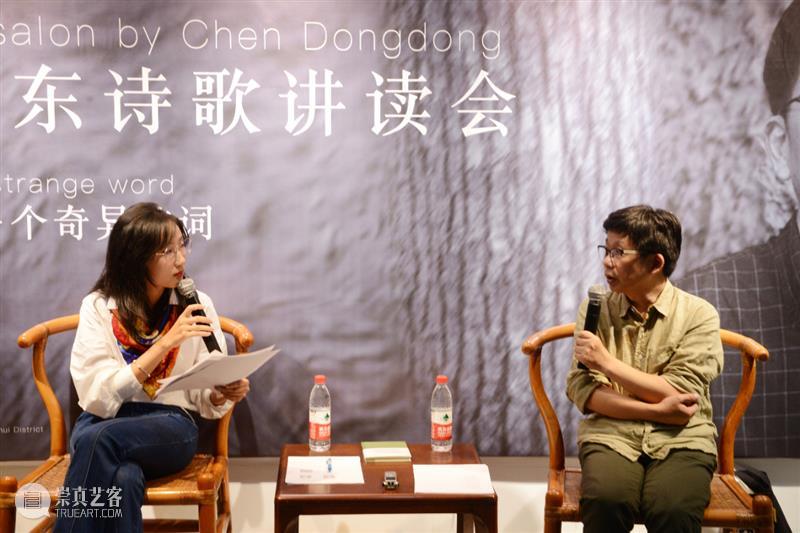
陈东东与朱春婷谈论诗歌中超现实与古典之间的关系
Chen Dongdong and Zhu Chunting discuss the relationship between the surreal and the classical in poetry.
Qian Zhian: Just now, Mr. Gu Gang introduced that we are the “flâneur” and I wrote urban poems. My thesis is also about the urban style of writing in Dongdong’s poems. Today, I was given at ask by Gu Gang before the event, to select a work of Dongdong and analysis it in detail. So I chose this one which I think is the closest to the contemporary urban life of our city, in the fourth page of "Vacation". I think this poem is very special among all of Dongdong's poems. It is very different from the well-known "Lighting up" and "Horse in the rain", and everyone would be able to feel this after reading it. First of all, the first line of this poem is very attractive, and it is called "the only change is unchangeable.". I think this is not the same as our previous philosophical experience. Our high school Chinese philosophy class says "the only unchangeable is constant change." Su Dongpo also told us that "zi qi bu bian zhe er guan zhi, ze tian di zeng bu neng yi yi shun", our experience has always been like this. In the first sentence of this poem, Dongdong used an indisputable and indisputable language to tell us that the only change is the same. In this way, with a contrast, the poetry is coming, and the reader will be brought into the rhythm, sensation and sensibility of the poetry, in the rhythm of non-rational. In fact, I think this sentence is also the poetic key of the whole poem, and the following four verses are actually talking about this. So we will see such words appearing in the following verses, such as "still", "as usual", "stable", "playback", "going forward", "repeat", These words keep appearing, emphasizing that "the only change is unchangeable." These words are wonderful. I think these words themselves have diachronic attributes, and they have aspects of time. Its appearance links two pictures, the past and the present, and connects time in one click. More generally speaking, because of the appearance of these words, the points of time becomes a timeline, and it itself has the infection of looping back and forth. It keeps appearing, and the loops form the aesthetic of cycle structure that Prof. Qian mentioned.
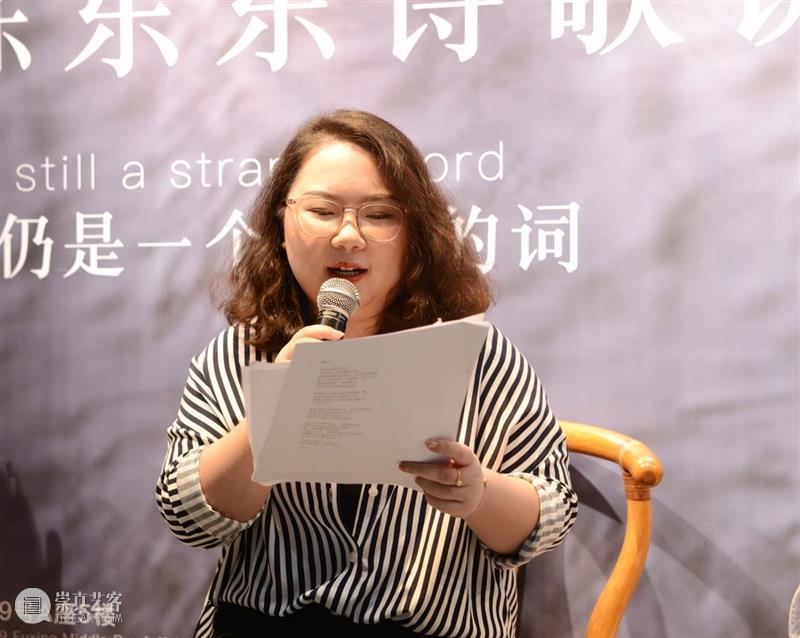
钱芝安赏析陈东东诗歌《度假》
Qian Zhian is appreciating Chen Dongdong’s Poem ‘Vacation’
我们接下来看这些词所链接的意象。其实这首诗里并没有⾮常陌⽣化的意象,相反的它出现的都是⽇常⽣活中⾮常常⻅的,像第⼀节“街巷”、“⼩旅馆”,“锦鲤”、“⻜⻦”,出现的这些并不是⾮常惊奇的意象,都是我们平时都⻅过的。但是东东⽼师⽤⾮常娴熟的诗歌技巧构建了⾮常完美的诗歌画⾯。我特别喜欢的是将⽔中悬浮的⻥比作不动的鸟,⼀下⼦就连接起来形成了水天一色画⾯。然后是第⼆诗节,它的“航班” “飞机”是⾮常现代城市的意象。“⼀盏打开往昔的灯照例昏⻩”,熟悉东东⽼师诗歌的都知道,灯是东东⽼师诗歌中惯用的意象,但这⾥这盏打开往昔的灯,和《点灯》里具有厚重历史感的灯显然是不⼀样的。镜头继续往下转,“灯下的茶碗和去年未及读完的书,照例摆放在同⼀家餐厅的同⼀张桌上。打烊时⼩费也照例”。这⼀诗节中这么多同类意象的并置,⼀下⼦把城市⽣活的画⾯丰富起来了。然后提到“⼩费”,第三诗节中⼜提到了“银⾏汇率”和“空⽓指数稳定与适宜”,这些肯定是影响城市⽣活幸福指数的很重要的元素。最后⼜回到了第⼀诗节的意象——天空的巨流化作一场重复的雨,意象本身也形成了回环往复的意境。所以这三个诗节中这些意象再佐以这些词,空间再加上时间这个轴,忽然之间就变得⽴体起来了。如果⼤家能够想象这个画⾯就会发现,东东⽼师就好像⼀个导演,镜头的切换⾮常⾏云流⽔,简单常⻅但是很典型,很丰富,很⼴阔。到这⾥结束我觉得东东⽼师⼀直是带着第⼀节中说的“⼀成不变”所附赠那种冷静克制、甚至有些戏谑的语⽓,像是城市⽣活的冷眼旁观者。但最后这个诗节我觉得所讨论的内容就有所不同,我们忽然之间仿佛穿越回去⼜变成了⽣活的⻆⽃⼠,⼜突然⾯对那些战争,那么是什么使我们能在快节奏的城市⽣活中去放下武器,去酩酊⼤醉呢?我认为很重要的就是最后这⼀句“确认此刻为真”。⼤家读前三节的时候⼀定会有⼀个疑惑,既然是这种好像循环往复地⼀直困在城市⼀成不变的⽣活当中的场景,那什么叫做“度假”呢?我觉得可能在最后⼀个诗节当中东东⽼师给到了答案。我的理解是,东东老师在最后这个诗节中讨论了生活本真的问题。什么为“真”,感受为真,这也让我想起了,古冈⽼师在明圆诗歌讲读会序言中所提到的⼀段话“我们的真实首先得⽴⾜于当下……⾁体和时光的永恒对峙,这就是我们的真实——诗性⽽尴尬的⾮诗意处境,它就在我们每天⽣活的城隅上空”,我觉得和这⼀⾸诗也有着异曲同⼯之妙。
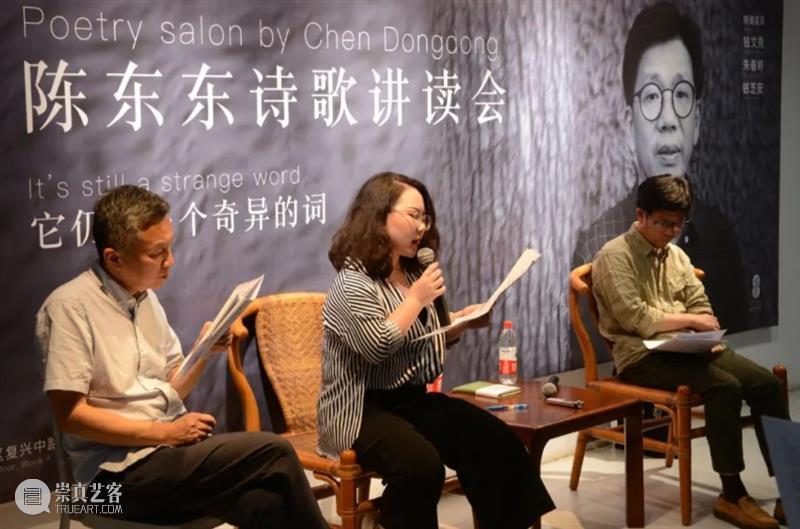
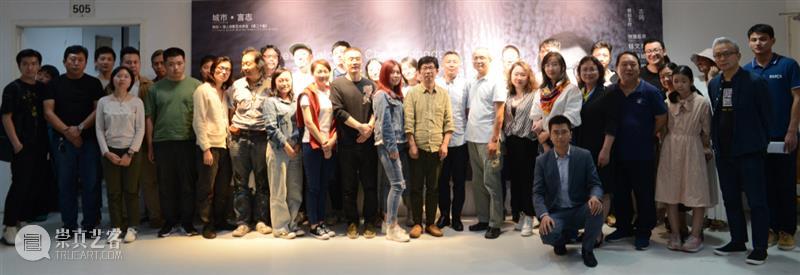
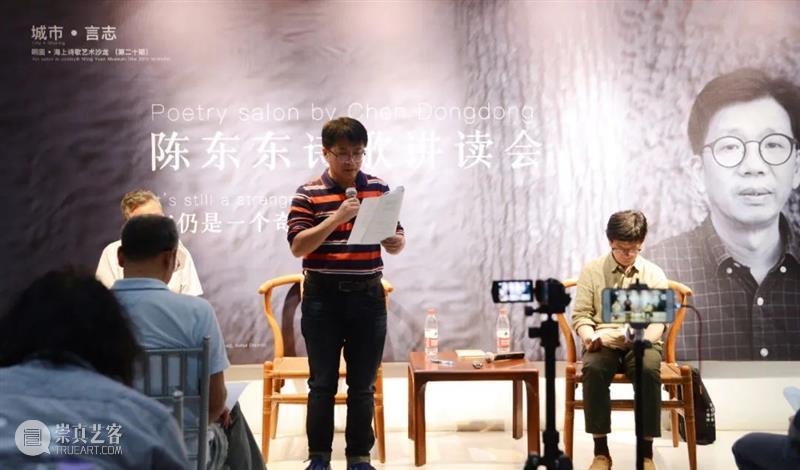
来宾朗诵诗歌
The audiences read poems on the salon
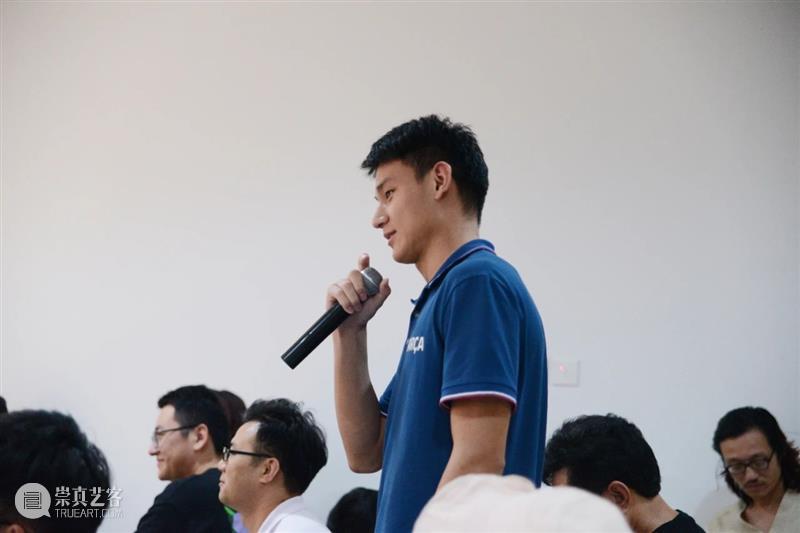
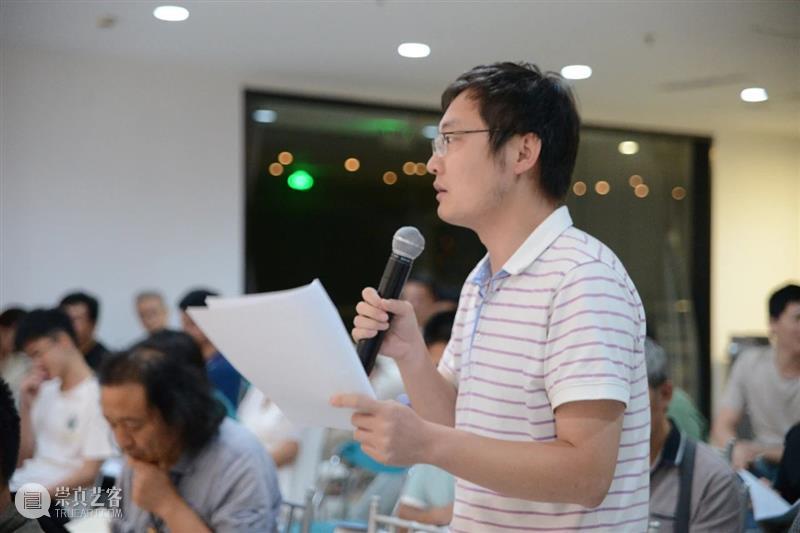
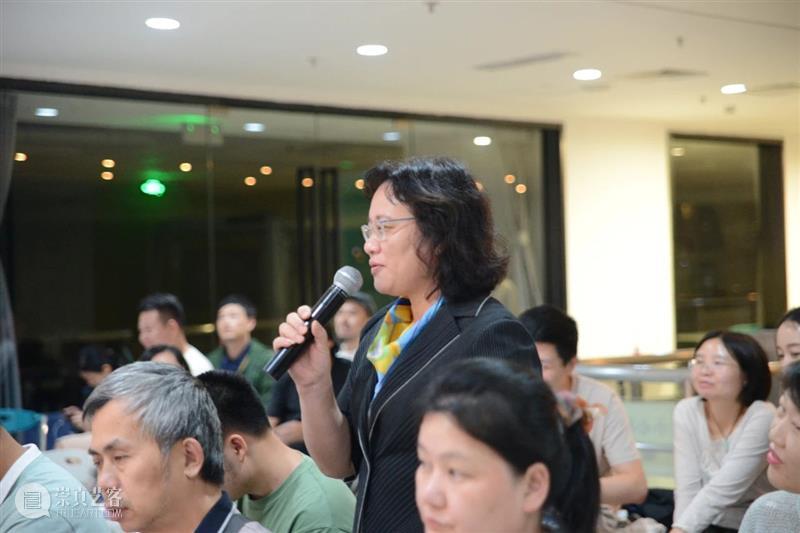
来宾现场提问
Audience questions
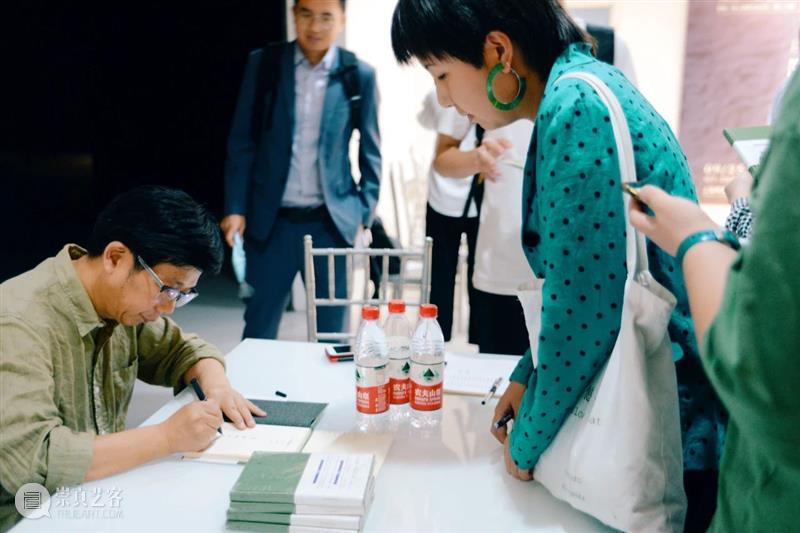
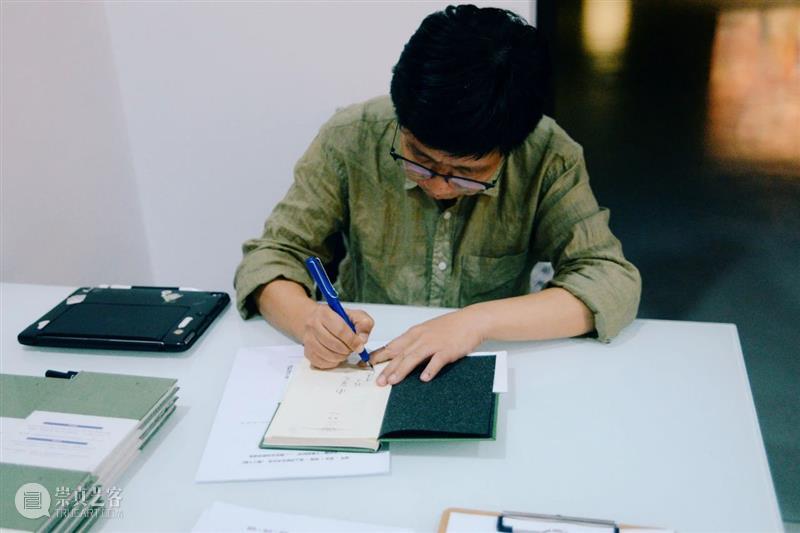
诗集签售
On site signing of poetry collection
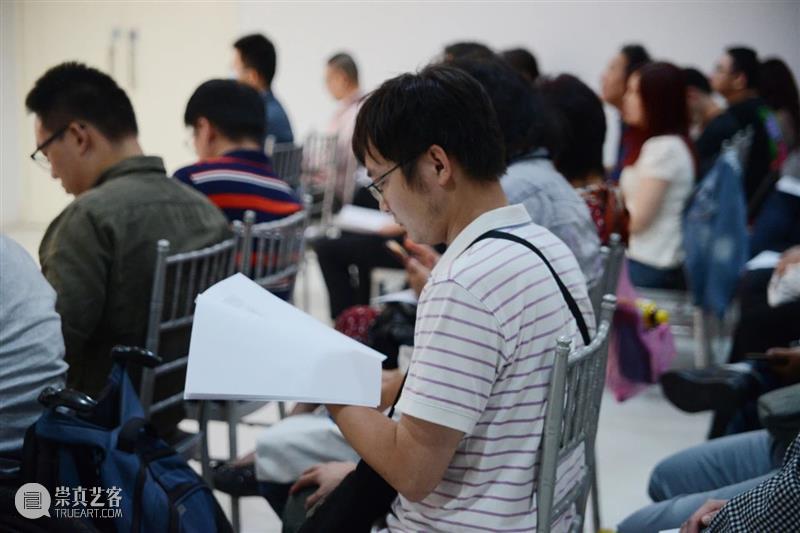
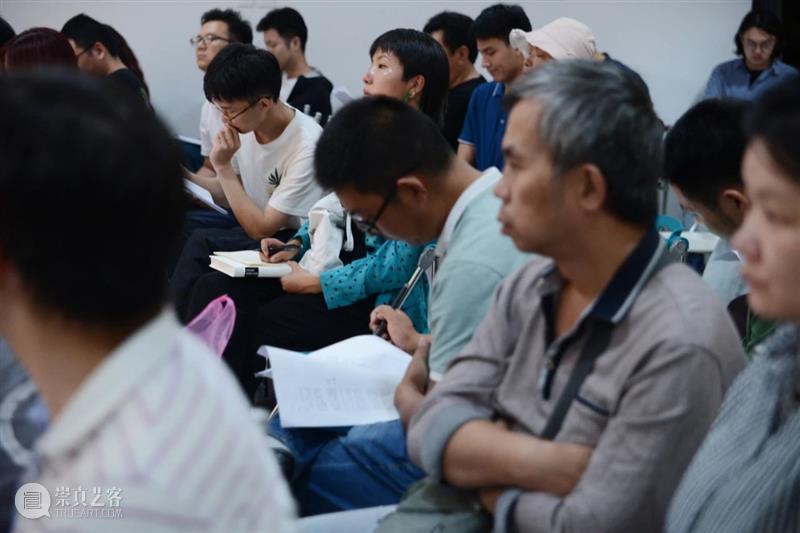
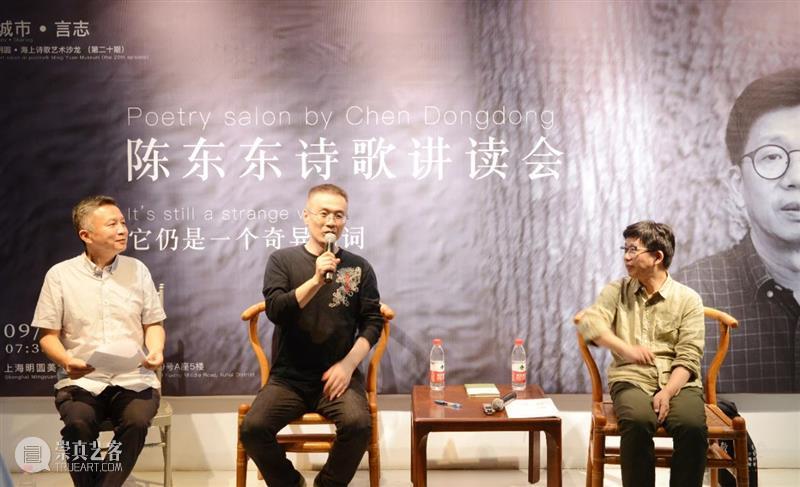
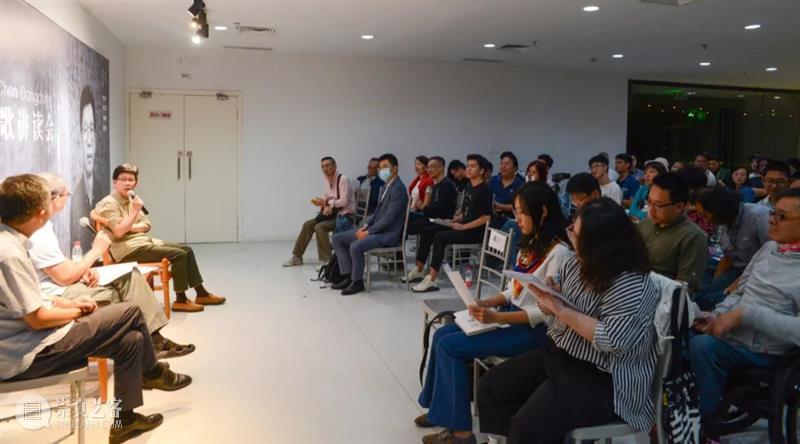
讲读会现场掠影
The audiences at the poetry salone
当前展览 Current Exhibition
本次展览免费,观展需提前预约。 Free entrance. Reservations are required in advance. 入馆前,请出示随申码并登记来访信息。 Before you enter the exhibition, please show your Shanghai QR Code to register. 全程佩戴口罩,与其他观众保持1.5米距离。 Pleace wear face masks, and keep a distance of 1.5m away from others.

更多内容 就在下期
Please follow for more information
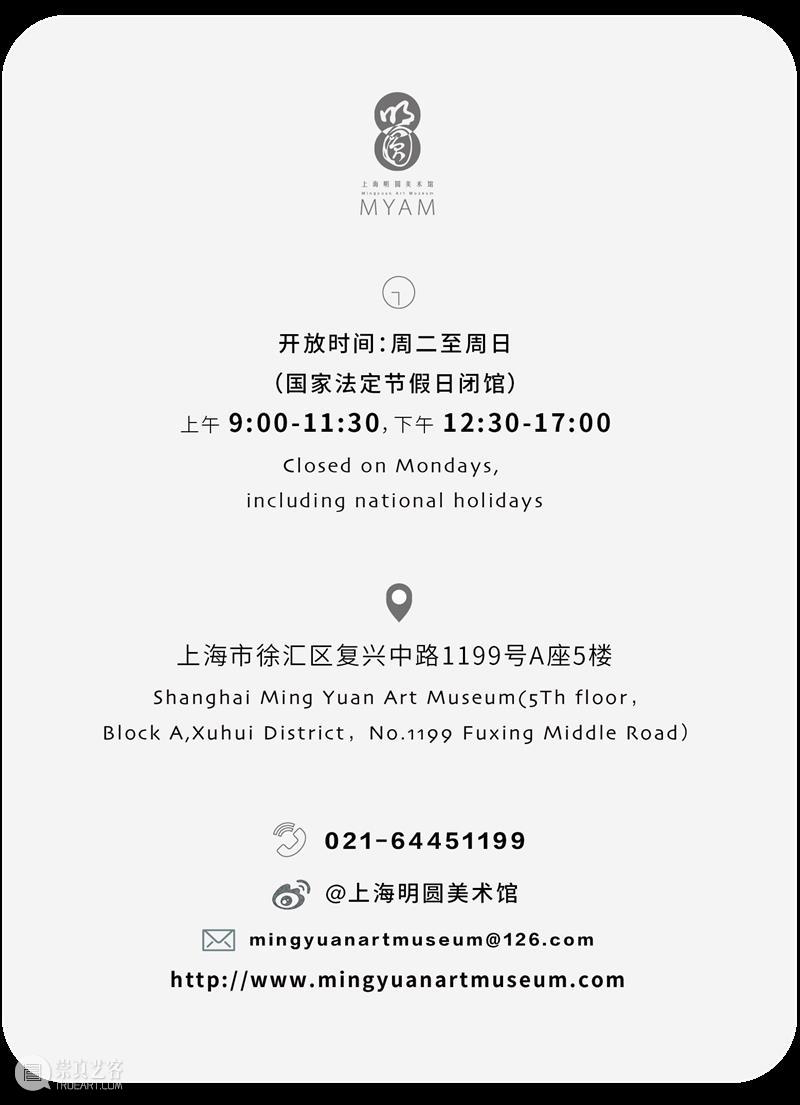


已展示全部
更多功能等你开启...
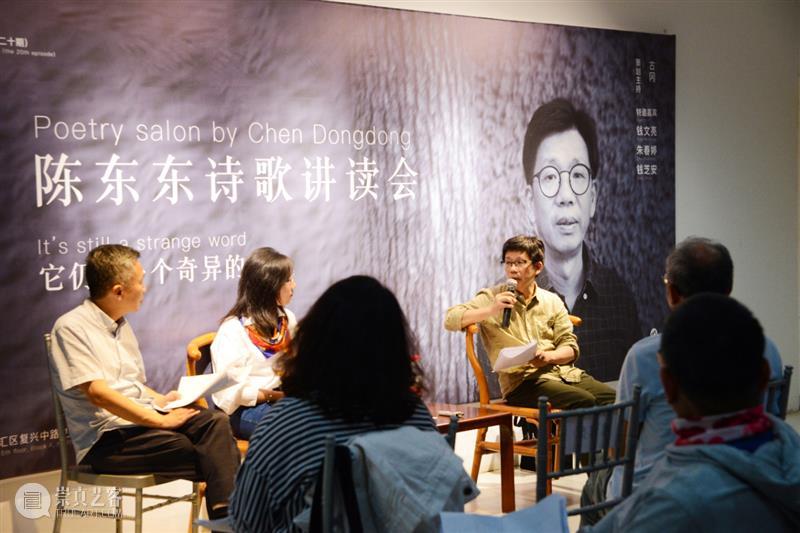






 分享
分享